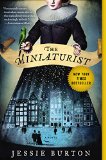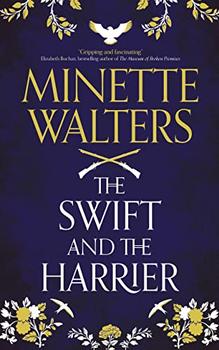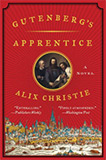Summary | Excerpt | Reading Guide | Reviews | Beyond the book | Read-Alikes | Genres & Themes | Author Bio

Jessie Burton's debut novel The Miniaturist is a fascinating tale of love and secrets set against the backdrop of 17th century Amsterdam. Built around a true historical artifact - Petronella Oortman's cabinet house - the novel explores duplicity and truth in a city obsessed with luxurious wealth but ruled by leaders preaching austerity.
Petronella (Nella) Oortman leaves her home in the country to marry Johannes Brandt, one of the most prominent merchants in Amsterdam, and she immediately meets a strange cast of characters who are now in her life. The maid, Cornelia, speaks at will and comports herself as an equal to her employers. The manservant, Otto, a black African, appears keen to hide his master's secrets. Marin, Nella's sister-in-law, seems uninterested in relinquishing her control over the household to Nella, who, as the wife in the home, should be in charge. And then there's the bizarre blonde-headed woman who continues to stare at Nella in the street, as if she knows exactly what Nella is thinking. To top it all off, Johannes, himself, does not appear until days after Nella's arrival.
Nella's new life, promising adventure and a love-filled marriage, seems more full of shadows and absence than anything exciting. Then, Johannes brings home his wedding present: a cabinet house, built to scale, replicating their home. Gilded with silver and inlaid with tortoise shell, the cabinet can barely fit into Nella's room. It is also empty. On a whim, Nella decides to hire a miniaturist to create furniture for the house. Her first order is duly fulfilled, but the package contains other, un-requested, items that turn the hair on Nella's neck. First, a cradle, exquisitely made; and second, two chairs that sit in the front room, identical to the ones in Nella's house, chairs the miniaturist surely has never seen. Has the miniaturist been in the house? How could he know to send chairs and a crib? As Nella seeks to understand the mystery of the miniaturist, other questions begin to tug at her: the mysterious whisperings in the hall after the candles are puffed out; where Johannes goes all day; and why Marin, who espouses to be holy and self-sacrificing, wears ermine fur inside the lining of her plain, Calvinist, black dresses.
This interplay of secret and truth, the real and the replicated, form the dramatic question of the novel: how do we know what is real? Burton's investigation of this theme radiates through every character and scene. The presence of the cabinet house then expands into a metaphor. Even though Nella can see the items in the cabinet house, they are not real but merely copies. She soon realizes that all the people around her are copies as well, each playing a defined role that keeps the machinery of Nella's world clicking in place. As Nella pulls the fake exterior away from her husband, sister-in-law, and household help, she understands that her fascination with love and life-long happiness are also merely copies, with no real connection to deeper feelings. Stripping the preconceived notions and misrepresentations away allows her to understand the actual nature of love, trust, and family.
The novel pulses with anticipation as Nella gets closer to determining the truth behind the miniaturist's gifts and the secrets in her own home, but the ending fades away without a satisfying wrap-up. Despite this, the absorbing characters and convincing historical atmosphere make The Miniaturist worth the read.
![]() This review was originally published in The BookBrowse Review in September 2014, and has been updated for the
June 2015 edition.
Click here to go to this issue.
This review was originally published in The BookBrowse Review in September 2014, and has been updated for the
June 2015 edition.
Click here to go to this issue.

If you liked The Miniaturist, try these:

by Minette Walters
Published 2023
A sweeping historical adventure set during one of the most turbulent periods of British history--featuring a heroine you'll never forget...

by Alix Christie
Published 2015
An enthralling literary debut that evokes one of the most momentous events in history, the birth of printing in medieval Germany—a story of invention, intrigue, and betrayal.
Your guide toexceptional books
BookBrowse seeks out and recommends the best in contemporary fiction and nonfiction—books that not only engage and entertain but also deepen our understanding of ourselves and the world around us.